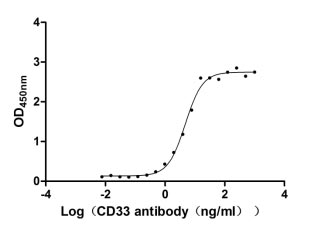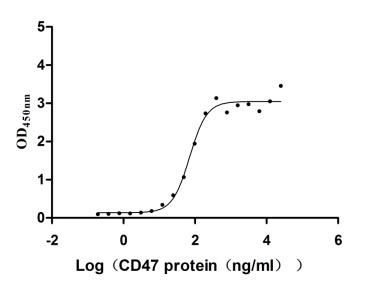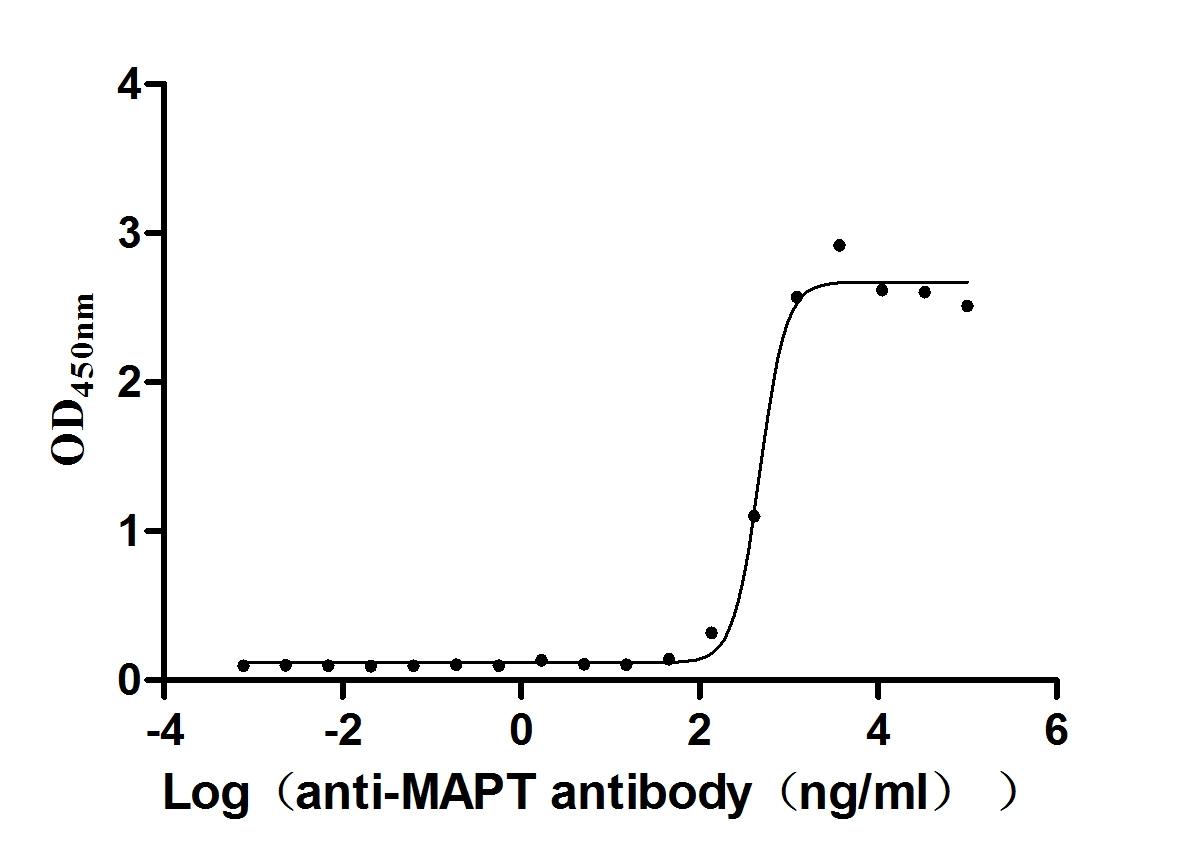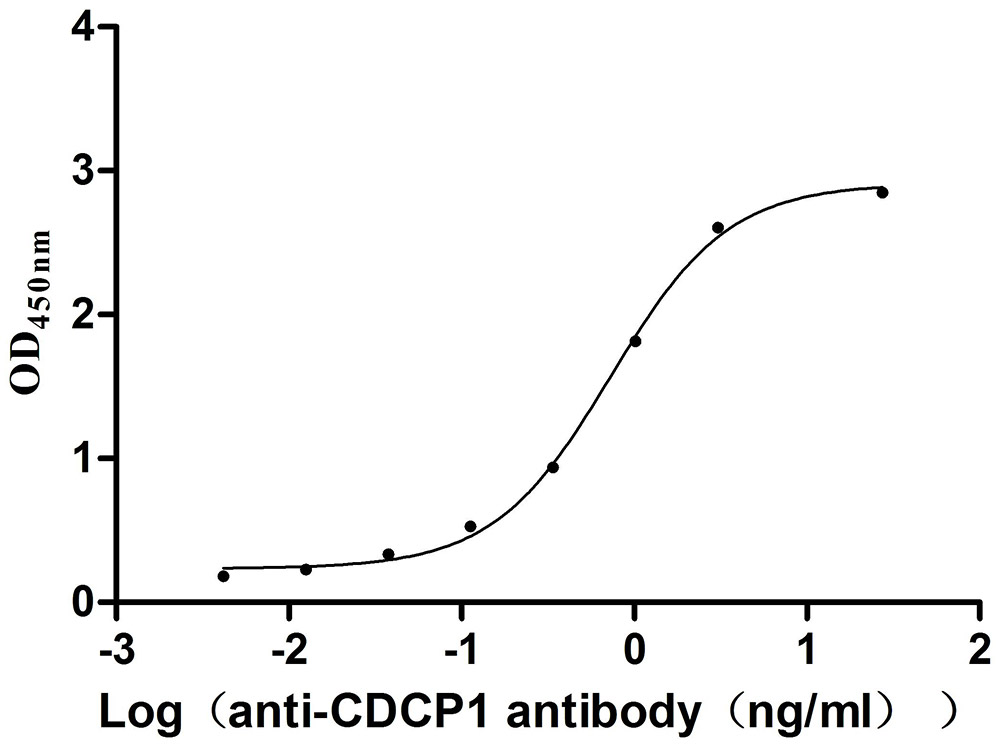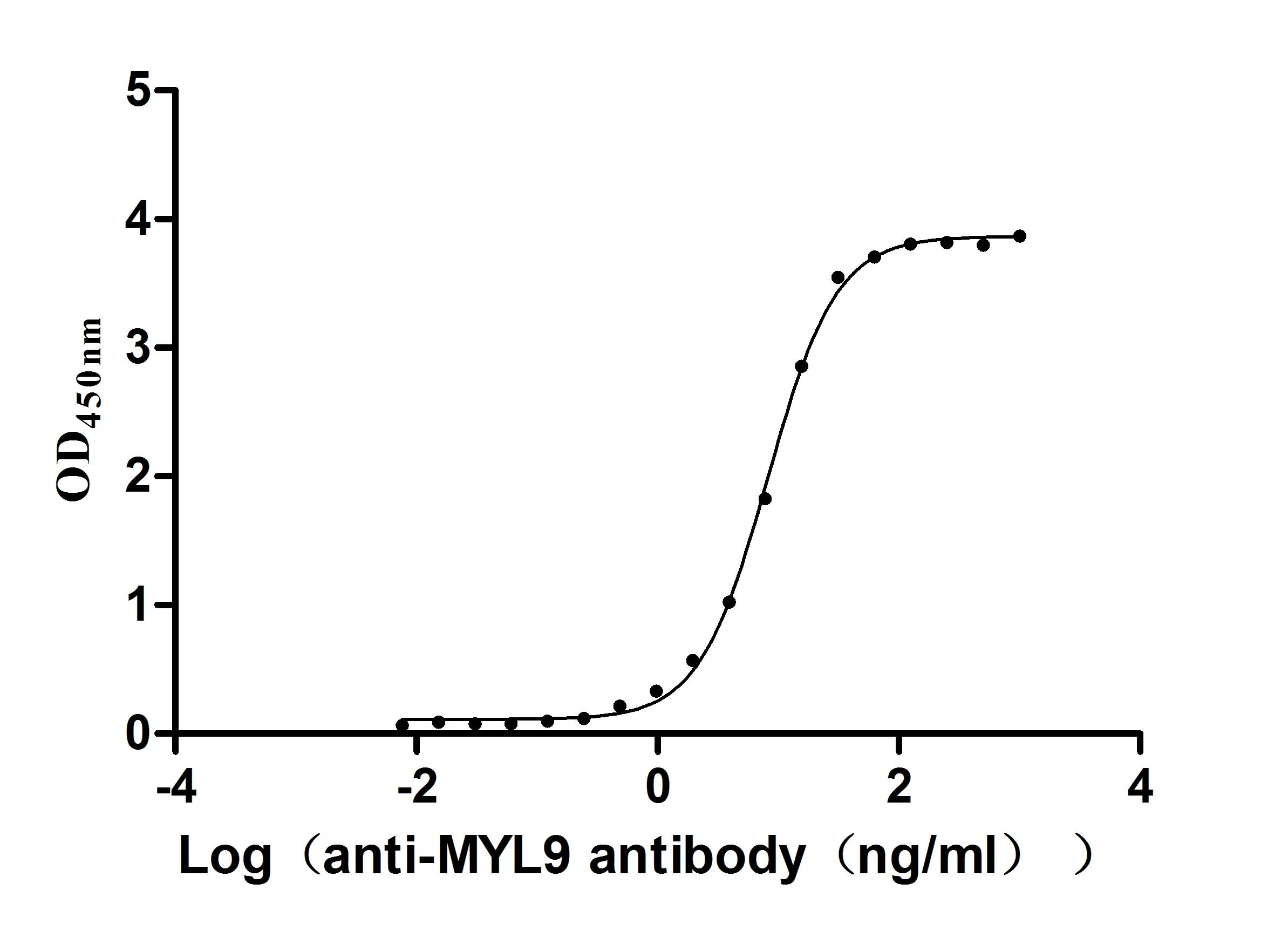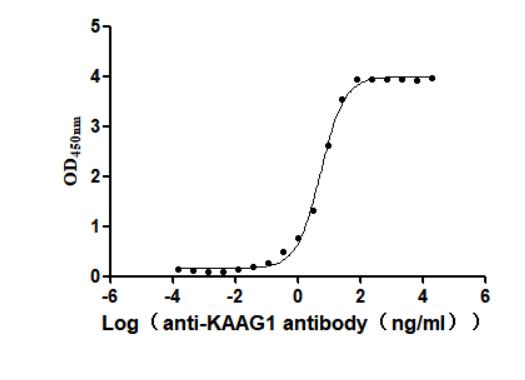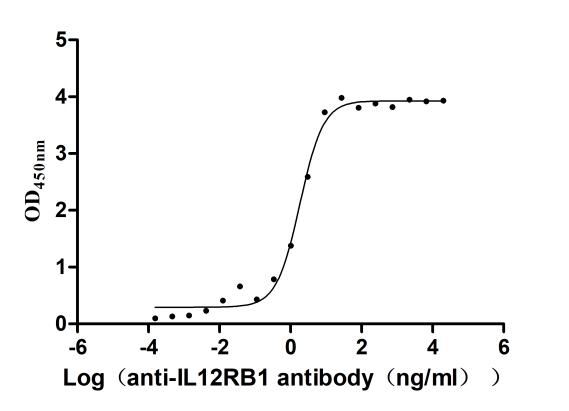Recombinant Human PERQ amino acid-rich with GYF domain-containing protein 2 (GIGYF2), partial
-
中文名称:人GIGYF2重组蛋白
-
货号:CSB-EP751088HU
-
规格:
-
来源:E.coli
-
其他:
-
中文名称:人GIGYF2重组蛋白
-
货号:CSB-EP751088HU-B
-
规格:
-
来源:E.coli
-
共轭:Avi-tag Biotinylated
E. coli biotin ligase (BirA) is highly specific in covalently attaching biotin to the 15 amino acid AviTag peptide. This recombinant protein was biotinylated in vivo by AviTag-BirA technology, which method is BriA catalyzes amide linkage between the biotin and the specific lysine of the AviTag.
-
其他:
-
中文名称:人GIGYF2重组蛋白
-
货号:CSB-BP751088HU
-
规格:
-
来源:Baculovirus
-
其他:
-
中文名称:人GIGYF2重组蛋白
-
货号:CSB-MP751088HU
-
规格:
-
来源:Mammalian cell
-
其他:
产品详情
-
纯度:Greater than 85% as determined by SDS-PAGE.
-
基因名:Name:GIGYF2 Synonyms:KIAA0642, PERQ2, TNRC15
-
Uniprot No.:
-
别名:GIGYF2; KIAA0642; PERQ2; TNRC15GRB10-interacting GYF protein 2; PERQ amino acid-rich with GYF domain-containing protein 2; Trinucleotide repeat-containing gene 15 protein
-
种属:Homo sapiens (Human)
-
蛋白长度:Partial
-
蛋白标签:Tag type will be determined during the manufacturing process.
The tag type will be determined during production process. If you have specified tag type, please tell us and we will develop the specified tag preferentially. -
产品提供形式:Lyophilized powder
Note: We will preferentially ship the format that we have in stock, however, if you have any special requirement for the format, please remark your requirement when placing the order, we will prepare according to your demand. -
复溶:We recommend that this vial be briefly centrifuged prior to opening to bring the contents to the bottom. Please reconstitute protein in deionized sterile water to a concentration of 0.1-1.0 mg/mL.We recommend to add 5-50% of glycerol (final concentration) and aliquot for long-term storage at -20℃/-80℃. Our default final concentration of glycerol is 50%. Customers could use it as reference.
-
储存条件:Store at -20°C/-80°C upon receipt, aliquoting is necessary for mutiple use. Avoid repeated freeze-thaw cycles.
-
保质期:The shelf life is related to many factors, storage state, buffer ingredients, storage temperature and the stability of the protein itself.
Generally, the shelf life of liquid form is 6 months at -20°C/-80°C. The shelf life of lyophilized form is 12 months at -20°C/-80°C. -
货期:Delivery time may differ from different purchasing way or location, please kindly consult your local distributors for specific delivery time.Note: All of our proteins are default shipped with normal blue ice packs, if you request to ship with dry ice, please communicate with us in advance and extra fees will be charged.
-
注意事项:Repeated freezing and thawing is not recommended. Store working aliquots at 4°C for up to one week.
-
Datasheet :Please contact us to get it.
相关产品
靶点详情
-
功能:Key component of the 4EHP-GYF2 complex, a multiprotein complex that acts as a repressor of translation initiation. In the 4EHP-GYF2 complex, acts as a factor that bridges EIF4E2 to ZFP36/TTP, linking translation repression with mRNA decay. Also recruits and bridges the association of the 4EHP complex with the decapping effector protein DDX6, which is required for the ZFP36/TTP-mediated down-regulation of AU-rich mRNA. May act cooperatively with GRB10 to regulate tyrosine kinase receptor signaling, including IGF1 and insulin receptors.
-
基因功能参考文献:
- Full-length GIGYF2 coimmunoprecipitates with AGO2 in human cells, and upon tethering to a reporter mRNA, GIGYF2 exhibits strong, dose-dependent silencing activity, involving both mRNA destabilization and translational repression. PMID: 27157137
- required, this finding may shed light on the GIGYF2-associated mechanisms that lead to PD and suggests insulin dysregulation as a disease-specific mechanism for both PD and cognitive dysfunction. PMID: 26134514
- Results suggest that the N56S and N457T of GIGYF2 are risk factors for Parkinson's disease in Caucasians, but not in Asians PMID: 26152800
- GIGYF2 and the zinc finger protein 598 (ZNF598) are identified as components of the 4EHP complex. PMID: 22751931
- Our result indicated that SCNA, LRRK2, UCHL1, HtrA2 and GIGYF2 genes' mutations might not be a main reason for Chinese Autosomal dorminant Parkinson's disease PMID: 22503729
- within the Chinese population, the c.297T>C p.Ala99Ala polymorphism of the GIGYF2 gene may be associated with an increased risk of developing Parkinson disease. PMID: 22115759
- These data, together with those recently reported by other groups, suggest that GIGYF2 is unlikely to be the PARK11 gene. PMID: 20060621
- No clearly pathogenic mutations are identified in GIGYF2 and ATP13A2 in Brazilian patients with early-onset Parkinson's disease. PMID: 20816920
- The results of this study did not support a role for GIGYF2 in the genetic etiology of Belgian Parkinson disease. PMID: 19321232
- GIGYF2 is unlikely to play a major role in PD in Japanese patients, similar to other populations. PMID: 20641165
- our findings suggest that GIGYF2 variants are not a frequent cause of Parkinson's disease in the Spanish population, since we found no clearly segregating GIGYF2 variants PMID: 19845746
- GIGYF2 variants are not associated with Parkinson's disease in the mainland Chinese Population. PMID: 20044296
- The results of this study do not support a major role of GIGYF2 in parkinson disease. PMID: 20004041
- We identified nine novel variants in GIGYF2 gene, which might be associated with PD in the Chinese population. PMID: 20178831
- These data strongly support GIGYF2 as a PARK11 gene with a causal role in familial Parkinson disease. PMID: 18358451
- Mutations in GIGYF2 are not strongly related to the development of the Parkinson's disease in Portuguese and North American populations. PMID: 18923002
- This study suggested that reported mutations in GIGYF2 are not a common cause of Parkinson's disease in Norway and United States. PMID: 19133664
- The results of this study concluded that neither of Asn56Ser and Asn457Thr variants plays a major role in the pathogenesis of parkinson disease. PMID: 19250854
- We believe that variation in a gene other than GIGYF2 accounts for the previously reported linkage finding on chromosome 2q36-37. PMID: 19279319
- The current genetic evidence suggestes that GIGYF2 is not a common cause od parkinson disease in several Caucasian. PMID: 19348706
- GIGYF2 Asn56Ser and Asn457Thr mutations are a rare cause of PD in North American Caucasian population PMID: 19429085
- analysis of GIGYF2 variants in Parkinson's disease from two Asian populations PMID: 19449032
- GIGYF2 mutations are not a frequent cause of Parkinson's disease PMID: 19482505
- This letter suggested that GIGYF2 is neither responsible for PARK11 nor a gene implicated in Parkinson disease. PMID: 19562763
- The GIGYF2 Asn56Ser mutation is rare in Chinese PD patients. PMID: 19638301
显示更多
收起更多
-
相关疾病:Parkinson disease 11 (PARK11)
-
蛋白家族:GIGYF family
-
数据库链接:
HGNC: 11960
OMIM: 607688
KEGG: hsa:26058
STRING: 9606.ENSP00000387170
UniGene: Hs.565319
Most popular with customers
-
Recombinant Human Myeloid cell surface antigen CD33 (CD33), partial (Active)
Express system: Mammalian cell
Species: Homo sapiens (Human)
-
Express system: Mammalian cell
Species: Homo sapiens (Human)
-
Recombinant Mouse Microtubule-associated protein tau (Mapt) (Active)
Express system: Mammalian cell
Species: Mus musculus (Mouse)
-
Recombinant Mouse CUB domain-containing protein 1 (Cdcp1), partial (Active)
Express system: Mammalian cell
Species: Mus musculus (Mouse)
-
Recombinant Human Myosin regulatory light chain 12B(MYL12B) (Active)
Express system: E.coli
Species: Homo sapiens (Human)
-
Recombinant Human B- and T-lymphocyte attenuator(BTLA), partial (Active)
Express system: Mammalian cell
Species: Homo sapiens (Human)
-
Recombinant Human Kidney-associated antigen 1(KAAG1) (Active)
Express system: Baculovirus
Species: Homo sapiens (Human)
-
Recombinant Human Interleukin-12 receptor subunit beta-1(IL12RB1),partial (Active)
Express system: Mammalian cell
Species: Homo sapiens (Human)


